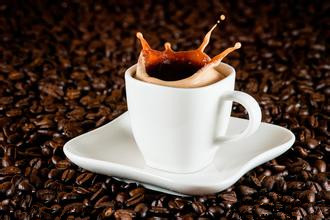The Origin of Coffee Culture the History of Coffee Culture in Europe
At first, coffee was just an exotic and joking drink for royalty and aristocrats besides mellow wine and beauties, which was no different from Chinese porcelain and Persian blankets. Their sense of taste is not adapted to such bitterness, and there is no need for the functionality of the drink. Coffee, as a drink, is an empty signifier for the royal family, and what really interests them is the exquisite porcelain plates, gorgeous clothes and pretentious etiquette, as if drinking coffee together can add some elegant meaning to the daily action of "drinking". Make it away from physical needs (drinking water) and ecstasy (drinking), at the same time, these characteristics of coffee also bring many ladies into it. They had previously been at odds with the rough, masculine world of wine. In the royal and aristocratic groups, drinking coffee seems to be a small ceremony, and its high cost becomes a permit, in which people are able to reconfirm their noble status and get a sense of satisfaction. Later, this sense of ritual changed its meaning and appeared on the dinner table of ordinary families. The family sips coffee in the early morning and has the first gathering within the family every day, during which the order and role of the family are strengthened day after day.

The mystery of "royal exclusive" has also infected the emerging citizen class and become the cause of many people's exposure to coffee. But it has not been easy for coffee to replace beer and spirits as a new daily drink. This is a profound change in living habits. Coffee, which is at the center of the change, has to be carefully studied and suspected under a magnifying glass at both the health and ethical levels. Karl von Linnay (1707-1778), the Swedish scientist who founded modern biological taxonomy, is representative of his view that the uplifting effect of coffee on the spirit sacrifices the internal balance of the body at the expense of health for the sake of development. At that time, this view echoed Rousseau's idea of "returning to nature" (1712-1778), and even today, this attitude of opposing a new thing to nature is no stranger. On the surface, this is people's rejection of strange things in the existing knowledge structure, but there is another question behind it: do people have the right to manipulate their bodies for some purpose?
Important Notice :
前街咖啡 FrontStreet Coffee has moved to new addredd:
FrontStreet Coffee Address: 315,Donghua East Road,GuangZhou
Tel:020 38364473
- Prev

Italian coffee an ebullient boutique coffee.
Europe is famous for its coffee culture, especially in Italy. Italians are very particular about coffee, and espresso based on espresso is popular all over the world. There are two things to watch out for when you go sightseeing in Italy: one is men, and the other is coffee. In Italy, coffee and men are actually two different things, so there is a famous Italian saying: men should be like good coffee.
- Next

How African Coffee Beans Were Accepted by European Civilization
Balzac carried a coffee-pot with him, and with the aid of this drink he was able to write for twelve hours a day; Beethoven must have consumed no less than sixty grams of coffee beans per cup of coffee, or he would have been furious; Voltaire is said to have drunk fifty cups of coffee a day, and no other drink has played such an important role in the history of human civilization
Related
- How did the Salvadoran coffee industry develop in Central America?
- What exactly does the golden cup extraction of coffee mean?
- The Origin of Coffee flower
- [2023 Starbucks World Earth Day] there are more meaningful things besides free Starbucks coffee!
- What kind of coffee is there in Spain? 9 Flavors of Spanish Coffee
- Aromatic African coffee| Kenya's coffee culture and historical production area
- Liberica Coffee Bean knowledge: the characteristics of Liberian Coffee beans of the three original species of Coffee beans
- The origin and formula of Spanish latte introduces the taste characteristics of Bombon coffee in Valencia, Spain.
- How to adjust the solution of over-extracted coffee
- What is the tasting period of coffee beans? What is the period of coffee and beans? How should coffee wake up and raise beans?

